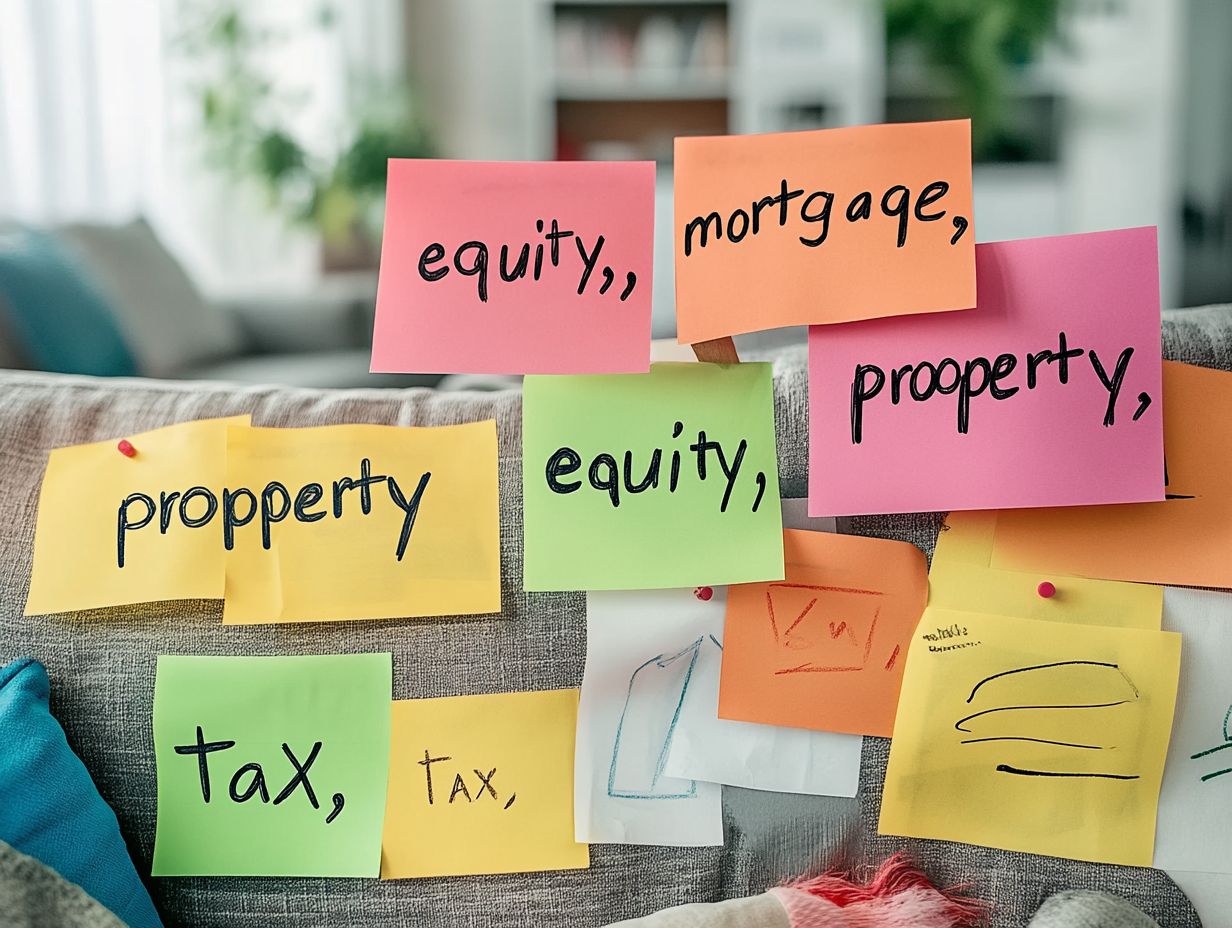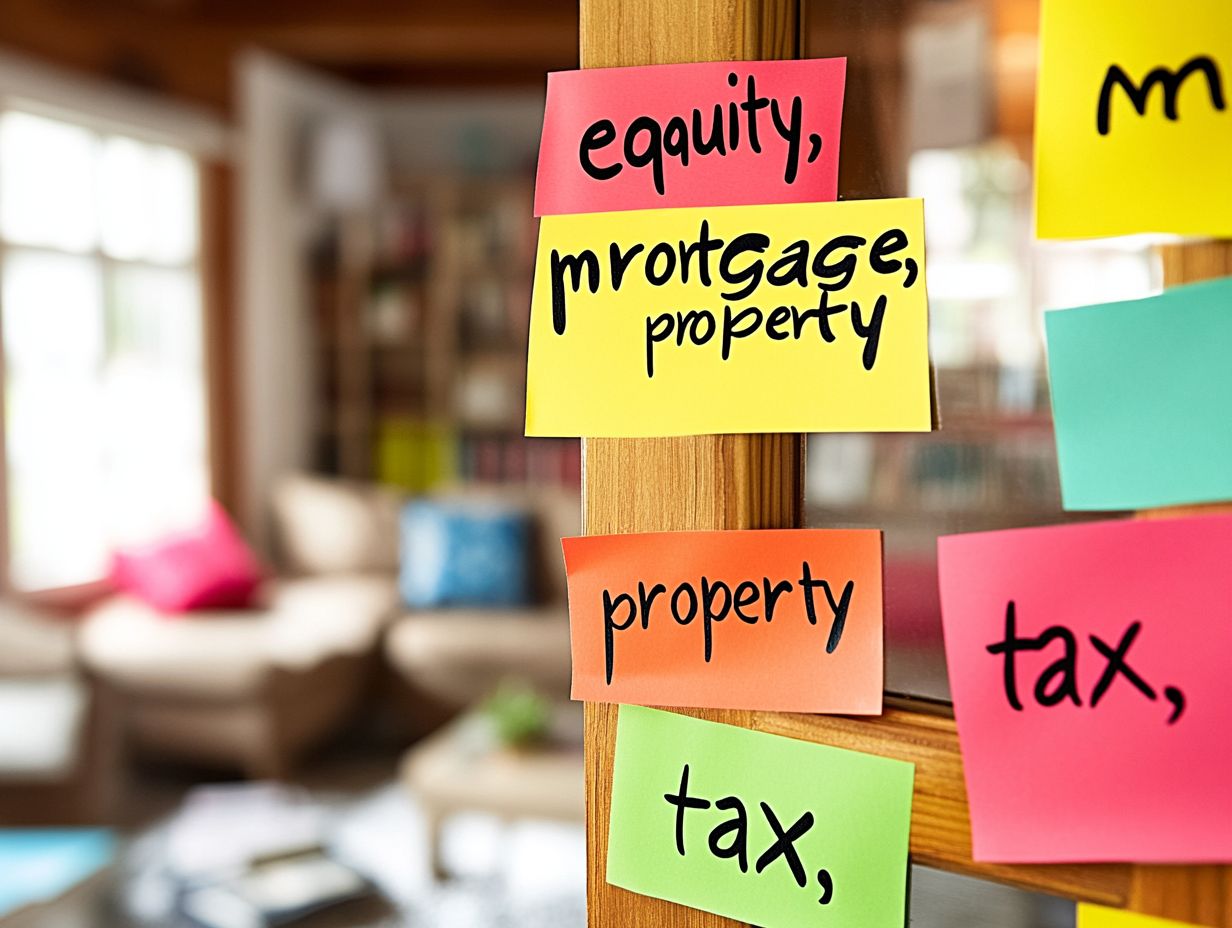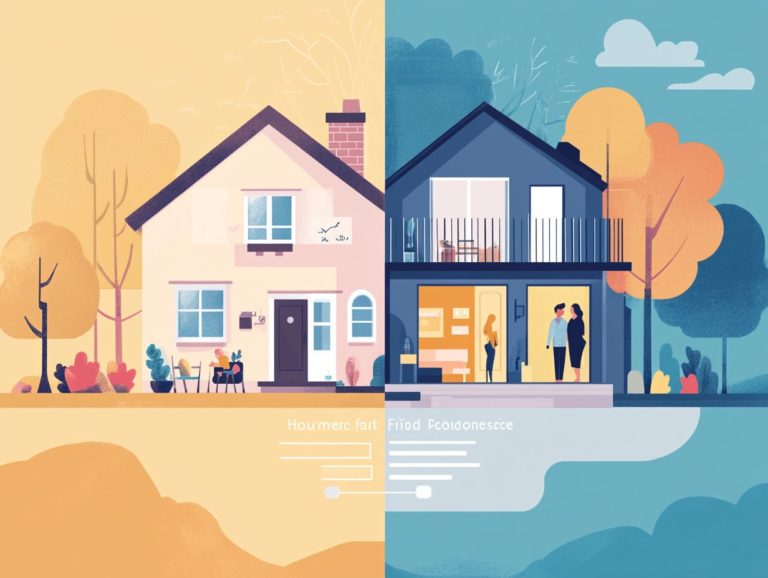Key Terms Every Homeowner Should Know
Navigating the world of homeownership can feel overwhelming, especially with many important terms and concepts to master.
From understanding your mortgage to learning about property taxes and closing costs, having a solid grasp of these key terms can significantly impact your home-buying journey.
This article highlights essential terminology every homeowner should know, empowering you to make informed decisions and protect your investment.
Dive in to demystify the language of homeownership and boost your confidence on this exciting journey.
Contents
- Key Takeaways:
- 1. Mortgage
- 2. Equity
- 3. Amortization
- 4. Appraisal
- 5. Homeowners Insurance
- 6. Property Taxes
- 7. Title Insurance
- 8. Closing Costs
- 9. Home Inspection
- 10. Down Payment
- 11. Escrow
- 12. Refinanciamiento
- 13. Home Warranty
- 14. Home Equity Loan
- 15. Foreclosure
- How Can Understanding These Terms Help Homeowners?
- Frequently Asked Questions
- What are some key terms every homeowner should know about home insurance?
- What is the difference between a fixed rate and an adjustable rate mortgage?
- What is the purpose of a home appraisal?
- What does it mean to have a lien on a property?
- What is a home warranty, and is it necessary?
- What are some common home maintenance tasks that homeowners should know?
- How Can Homeowners Educate Themselves on These Terms?
Key Takeaways:

Key terms such as mortgage, equity, and amortization are crucial for homeowners, as they impact financial responsibility and ownership. Familiarity with terms like appraisal, property taxes, and title insurance is essential to safeguard your investment.
Not understanding these key homeownership terms can lead to costly mistakes, making it vital for homeowners to educate themselves.
1. Mortgage
A mortgage is a key tool for buying a home, allowing you to borrow money from lenders with the property itself securing the loan. This process includes elements such as fixed-rate or adjustable-rate mortgages, down payments, and closing costs.
As a borrower, it’s essential to understand the differences between fixed-rate mortgages, which offer a stable interest rate throughout the loan, and adjustable-rate options, which can change based on market conditions.
A significant down payment can influence your loan terms. Additionally, a strong credit history can help you access better interest rates.
If your down payment is less than 20%, it’s important to consider private mortgage insurance (PMI), which protects lenders if you default on the loan. By reviewing loan estimates and closing disclosures carefully, you can understand the costs involved and make informed decisions aligned with your financial goals.
2. Equity
Equity is the portion of your home that you truly own, calculated by subtracting any outstanding mortgage balance from the current market value of your property. This concept is vital for homeowners, especially when considering property appreciation and the risks of foreclosure.
Over time, property values usually increase while your mortgage payments reduce your debt, allowing you to build more equity and enhance your financial standing.
You can access this growing equity through home equity loans or lines of credit, quickly funding your dream renovations or covering unexpected emergencies!
However, it’s crucial to understand the implications of these options. Falling behind on payments for borrowed equity could put you at risk of foreclosure and jeopardize the equity you’ve built over the years. Therefore, managing this vital financial asset responsibly is essential.
3. Amortization
Amortization is the process of gradually paying off a loan, such as a mortgage, through regular payments that combine both principal and interest. This process leads to a zero balance and helps you build equity over time.
As a homeowner, knowing how your loan payments work is crucial. It details each monthly payment, showing how much goes to interest and how much reduces the principal balance.
This insight is particularly important when comparing fixed-rate mortgages, where the interest rate remains constant, with adjustable-rate mortgages, which can fluctuate with market conditions.
By understanding these loan types, you can enhance your financial strategy, potentially lowering your closing costs and increasing your equity. Recognizing the right moments to refinance or make extra payments can lead to significant savings on total interest paid.
4. Appraisal
An appraisal is a vital assessment of a property s market value, carried out by a licensed appraiser. This process is important for your mortgage, influencing loan amounts and closing costs.
This evaluation protects lenders and affects you as a borrower by making sure you don t borrow more than the property is worth. It also determines your equity position, which is the value of your property that you own outright.
When the appraised value is higher, it can mean huge savings and better mortgage options for you!
By understanding the implications of the appraisal, you can gauge your potential for property appreciation over time. As the market evolves, appraisals become crucial for assessing growth, ensuring you are well-prepared to navigate your financial future with confidence.
5. Homeowners Insurance
Homeowners insurance is not just a necessary policy; it’s your shield against potential damages and liabilities. It’s often required by lenders during the mortgage process and plays a crucial role in protecting the equity you’ve built in your property.
This insurance does more than satisfy lender demands; it grants you peace of mind, knowing you re shielded from a wide array of risks, from natural disasters to theft.
You have various types of coverage at your disposal, each crafted to meet specific needs ranging from basic protection for your home and belongings to comprehensive policies that include liability coverage for accidents occurring on your property.
In unfortunate situations like a fire or flooding, having the right coverage ensures that your investment remains secure. It helps maintain your equity and allows you to recover without overwhelming financial burdens.
6. Property Taxes
Property taxes are imposed by local governments based on the assessed value of your property. They represent a recurring expense you’ll need to factor into your budget alongside mortgage payments and closing costs. Homeowners association fees can also play a role in this equation.
The calculation of these taxes typically involves a local assessment that establishes the fair market value of your property, impacting what you owe each year. This can challenge potential homeowners, especially in areas where property values are rising, which can lead to higher tax rates and strain mortgage affordability.
Homeowners associations primarily focus on upholding community standards, but they may also influence the assessment process, indirectly shaping your property tax burden. This emphasizes the necessity of understanding all associated costs when navigating the real estate landscape.
7. Title Insurance

Title insurance is an essential safeguard for you as a homeowner or lender, protecting against potential issues like liens or disputes related to property ownership. It plays a vital role in the mortgage closing process, typically included in closing costs and managed within the escrow framework.
This insurance serves an important function, shielding you from uncertainties that may arise after the transaction is finalized. It primarily comes in two forms:
- Owner’s title insurance, which provides coverage specifically for you as a homeowner.
- Lender’s title insurance, which secures the lender s investment.
By addressing unforeseen claims, such as hidden liens or ownership disputes, it offers you valuable peace of mind. Understanding how title insurance integrates with the escrow process can illuminate its role in overall closing costs, ensuring that both you and the other party are adequately protected during this significant transaction.
8. Closing Costs
Closing costs are the various fees and expenses tied to finalizing your mortgage transaction. Understanding these costs is essential. Don’t let surprise fees catch you off guard!
These can include charges like appraisal fees, title insurance, and escrow services, making it crucial for you to grasp them in order to budget effectively. Closing costs vary by location and lender policies, typically ranging from 2% to 5% of the property s purchase price.
For example, in bustling urban centers, you may encounter higher fees driven by increased demand for services, while more rural areas often present lower closing costs. It’s also essential to recognize that lenders may have different structures for their closing fees.
Therefore, you should carefully compare offers to find the best fit for your situation. Budgeting for these expenses is crucial. Unexpected costs can quickly disrupt your financial plans.
9. Home Inspection
A home inspection is a detailed check of a property’s condition carried out by a qualified inspector. This check gives you important information as a buyer and can save you headaches and money. Don’t skip this critical step!
Grasping the findings from this inspection can reveal necessary repairs or maintenance issues that might otherwise escape your notice. This information is crucial during negotiations, giving you the power to request concessions from the seller or adjust your offer in light of the property’s condition.
Fixing issues early saves you money in the long run. A thorough inspection provides a strong foundation for knowledge-based decision-making, equipping you to navigate the path to homeownership with confidence.
10. Down Payment
A down payment is your initial upfront contribution toward the purchase price of a home, and it plays an important part in shaping your mortgage terms. This includes everything from your monthly payments to whether you’ll need private mortgage insurance (PMI), which is insurance to protect the lender if you can’t pay your mortgage.
You have a variety of options when it comes to down payments, typically ranging from as low as 3% for certain loan programs to the traditional 20%. While a smaller down payment can make homeownership more accessible in the short term, it may lead to higher monthly payments and the requirement for PMI.
On the flip side, making a larger down payment can significantly enhance your mortgage affordability. It reduces your monthly payments and eliminates the need for PMI.
As equity accumulates essentially your ownership stake in the home you ll likely experience greater financial stability and the potential to borrow against that equity, ultimately enriching your long-term wealth prospects.
11. Escrow
Escrow is a simple financial process where a neutral third party temporarily holds funds or assets on your behalf during the home buying process. This ensures that both you and the seller meet your obligations regarding the mortgage, closing costs, and title insurance.
This intermediary plays a vital role in safeguarding the interests of both parties, offering you peace of mind throughout the transaction. As the mortgage process unfolds, various expenses, such as property taxes, homeowners insurance, and even association dues, may be collected and managed within an escrow account.
By seamlessly coordinating these payments and securely holding funds, this system helps prevent any disputes that could arise over financial obligations. This allows you to concentrate on closing the deal without the stress of fund mismanagement or missed payments clouding your experience.
12. Refinanciamiento
Refinancing is a strategy that allows you to replace your current mortgage with a new one, often aimed at securing more favorable loan terms, lower interest rates, or accessing the value of your home that you own outright. However, it’s important to keep in mind that this process involves closing costs that warrant careful consideration.
Before you make this important financial choice, it s crucial to weigh the potential benefits against the possible drawbacks. While refinancing can lead to lower monthly payments and improved cash flow, it can also affect your home equity and overall debt levels. Take the time to evaluate how these factors align with your long-term financial aspirations.
It s essential to assess your current credit score and the prevailing market conditions. Also, consider how quickly you could make up the closing costs with the savings from your monthly payments, as this will ultimately guide you in determining whether refinancing is a wise move.
13. Home Warranty
A home warranty acts as a valuable service contract that takes care of the repair or replacement of major home systems and appliances, offering you peace of mind especially during the mortgage process and after a comprehensive home inspection.
This warranty typically covers essential components such as plumbing, heating, air conditioning, and significant kitchen appliances. This way, you can rest easy knowing that unexpected breakdowns won t disrupt your daily life or stretch your budget.
Remember, a home warranty is different from homeowners insurance, which primarily safeguards your property against risks like fire or theft.
Getting a home warranty can really save you money! It helps shield you from the high costs associated with appliance failures, allowing for more predictable budgeting and fewer financial surprises down the road.
14. Home Equity Loan

A home equity loan gives you the opportunity to tap into the equity you’ve built in your property, providing you with a lump sum of cash that can be used for major expenses, renovations, or even debt consolidation.
However, it’s essential to approach this option with careful consideration of mortgage terms and closing costs. It’s crucial to understand how this type of loan works, as it can offer advantages like lower interest rates compared to personal loans.
With fixed repayment terms, home equity loans can simplify your monthly budgeting, making it easier to manage your finances. However, there are risks to keep in mind, such as the potential for foreclosure if you miss payments since your property serves as collateral.
Unlike traditional mortgages that finance a home purchase, these loans are specifically linked to the value of your home that you own outright. The closing costs associated with home equity loans can vary significantly, which can affect your overall financial strategy.
It’s crucial to perform clear calculations to ensure that this option aligns with your financial goals. Don t miss out on the chance to use your home s value for important needs!
15. Foreclosure
Foreclosure is a formal procedure that allows lenders to reclaim properties when you’re unable to meet your mortgage obligations. This process can have significant implications for your equity and credit history.
Many things can lead to foreclosure, like job loss, unexpected medical expenses, or fluctuating interest rates that make those monthly payments feel insurmountable.
When foreclosure happens, you not only face the immediate loss of your home but also watch your accumulated equity disappear, which can impact your financial stability for years to come. A foreclosure record can significantly lower your credit score, making it difficult to secure future loans or favorable mortgage terms.
However, there are strategies you can explore to potentially avoid foreclosure and improve your financial outlook. Options like loan modifications, short sales, or seeking assistance from housing counselors may offer pathways to navigate this challenging situation.
How Can Understanding These Terms Help Homeowners?
Understanding key terms like mortgage, equity, insurance, and appraisal helps you make better choices. This knowledge allows you to manage your investments and navigate property ownership confidently.
If you know your mortgage options, you can choose the best financing plans. This choice can lower your monthly payments and save you money.
Understanding equity helps you recognize how paying down your mortgage increases your ownership stake, leading to greater financial stability.
When you understand insurance, you can choose suitable policies to protect your assets against unforeseen events. This ensures peace of mind.
Knowing about appraisals equips you to evaluate property values accurately. This aids in negotiation processes and fosters property appreciation in an ever-changing market.
What Are Some Other Important Terms Related to Homeownership?
Along with mortgages and equity, there are several key terms you should grasp as a homeowner, such as closing costs, escrow, and homeowners associations. Each of these plays a significant role in shaping your overall homeownership experience.
Understanding closing costs is essential, as these fees arise during the property transfer process and can have a substantial impact on your budget.
Escrow serves as a neutral third party that holds funds during a transaction, ensuring that neither you nor the seller can access the money until all conditions are satisfied.
Being aware of homeowners associations, particularly common in community developments, allows you to understand the rules and fees associated with property maintenance and shared amenities.
Familiarizing yourself with these terms empowers you to navigate the complexities of buying, selling, and maintaining your property with greater confidence and ease.
How Can Homeowners Protect Themselves with These Terms?
Homeowners can safeguard themselves and their investments by mastering critical concepts such as insurance, mortgage obligations, and equity management. These tools are invaluable in protecting against potential risks like foreclosure.
By securing adequate insurance coverage, you can shield your property from unforeseen disasters that could lead to significant financial setbacks.
A solid grasp of mortgage terms gives you the power to navigate your repayment options with confidence, steering clear of pitfalls that might jeopardize your financial health.
Maintaining a healthy equity position not only ensures stability but also opens doors to accessing funds if needed.
Together, these strategies create a robust safety net, allowing you to mitigate risks while enhancing your overall financial well-being.
What Are the Consequences of Not Knowing These Terms?
Not being well-versed in essential homeownership terms can lead to significant consequences, potentially placing you in financial jeopardy, such as facing foreclosure or encountering unexpected closing costs.
Consider the countless stories of homeowners who unwittingly signed contracts packed with hidden fees due to a misunderstanding of the terminology. One individual believed that a “fixed-rate mortgage” meant their payments would remain unchanged, only to find themselves grappling with mounting financial stress when they discovered that included fees could actually fluctuate.
Similarly, lacking knowledge about property taxes can lead to severe penalties or even the loss of your home. These scenarios serve as critical reminders that ignorance can foster poor decisions.
Are you ready to empower yourself with knowledge that protects your investment? It s essential to educate yourself on the nuances of property ownership to safeguard your investments and ensure long-term financial security.
Frequently Asked Questions

What are some key terms every homeowner should know about home insurance?
Key terms in home insurance include deductibles, premiums, coverage limits, and exclusions. These terms affect your policy s cost and coverage.
What is the difference between a fixed rate and an adjustable rate mortgage?
A fixed-rate mortgage has a set interest rate that does not change over the loan’s life. In contrast, an adjustable-rate mortgage has an interest rate that can fluctuate based on market conditions. Homeowners should know which type of mortgage they have to manage their monthly payments effectively.
What is the purpose of a home appraisal?
A home appraisal evaluates a property’s value. It is typically required by lenders before approving a mortgage loan and helps determine the fair market value of a home for sale or refinance purposes.
What does it mean to have a lien on a property?
A lien is a legal claim against a property for unpaid debts or obligations. It can be placed on a property by a lender, contractor, or government agency and can affect a homeowner’s ability to sell or refinance their home until the debt is paid off.
What is a home warranty, and is it necessary?
A home warranty is a service contract covering the cost of repairs or replacements for major home systems and appliances. While it is not necessary, it can provide homeowners with peace of mind and potentially save money on unexpected repairs.
What are some common home maintenance tasks that homeowners should know?
Common home maintenance tasks include changing air filters, cleaning gutters, checking for water leaks, and maintaining the exterior of your home. Staying on top of these tasks can help prevent costly repairs in the future.
How Can Homeowners Educate Themselves on These Terms?
Take charge of your learning! Dive into essential terms related to homeownership through financial education programs, real estate workshops, and online platforms focusing on topics like mortgages, equity, and appraisals.
Seek out these educational resources to boost your knowledge and cultivate a deeper understanding of the financial landscape that comes with owning a home. Books on real estate investing and home maintenance provide valuable insights and practical tips for your ownership journey.
Enroll in online courses for structured learning and expert insights. Numerous websites offer articles, webinars, and forums designed to foster discussions and answer your pressing questions.
This proactive approach equips you to navigate the complexities of homeownership with confidence and clarity.




